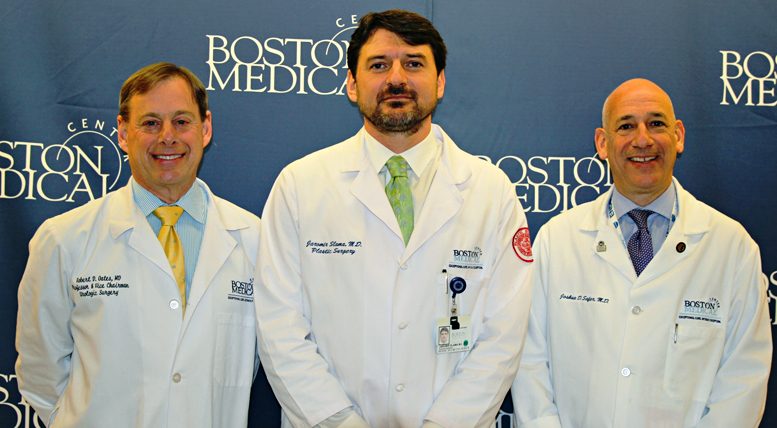BMC will offer near-comprehensive services for transgender community
By: Mike Givens/TRT Assistant Editor—
In mid-May, Boston Medical Center (BMC) announced that it will open a center devoted exclusively to providing healthcare for transgender people, the first hospital to do so in the Northeast.
“This is an important addition to our surgical offerings as it truly represents BMC’s commitment to industry-leading medical care and to serving the needs of all members of our community,” said Kate Walsh, president and CEO of BMC, in a press statement. “For many of our transgender patients, surgery is the only way for them to lead a more complete life.”
BMC’s Center for Transgender Medicine and Surgery will provide primary care, mental health services, hormone therapy and several surgical procedures for transgender people at its new facility, which opened on May 18. It will start performing male-to-female genital surgical procedures in the late summer.
BMC currently provides male-to-female surgeries such as facial feminization (a series of procedures that alter typical male facial features into typical female facial features that can include lip augmentation, cheek implants, brow lifts, and other surgeries) and mammaplasty (a surgical procedure to reshape and augment the breasts), which is also known as “top surgery.” The new center will offer these procedures as well as neovaginoplasty (the creation of a vagina through the inversion of the penis) as well as orchiectomy (the removal of testicles), which are also known as “bottom surgery.” BMC, however, will not offer female-to-male genital surgical procedures at this time.
“The fact that BMC now offers these services could mean significantly less cost for people ( not having to travel out of state for surgery), less stress … and overall, I think it reinforces the important message that there is nothing wrong with [being] transgender and there is nothing wrong with transgender people accessing the healthcare they need and want,” said Kaden Avery Mohamed, a trans activist who lives in Allston, MA.
Garrett Garborcauskas, a research technician in the healthcare field who has advocated for more trans-competent health care services, said that BMC’s announcement will provide a continuity of care that will help make the transition process easier.
“Having trans primary care, trans endocrinology, trans mental health, and trans surgery under the same roof means less time is spent trying to find trans-competent (never mind trans-compassionate) providers … and having to educate doctors,” he said, noting that as a member of the trans community he believes BMC is making great progress. “Having the doctors within the same system is incredible, and can help treat the whole patient.”
Trans people often find it frustrating when faced with doctors who are incompetent around issues of gender identity or have to see several doctors at several different practices to procure the full array of services they need.
According to a spokesperson for Boston Medical Center, the staff will do its best to ensure a solid continuum of care for new and current clients.
“Current and new patients at BMC who are interested in male-to-female transgender genital surgery will undergo a [thorough] physical and mental health evaluation by BMC clinicians, or if preferred, BMC clinical staff will work with the patient’s current primary care and behavioral health providers to obtain the patient’s medical records and any pertinent diagnostic test results,” said BMC’s Associate Director of Media Relations Ellen Slingsby. “The medical record and test results will then be reviewed and discussed by a panel of providers at BMC who have been selected to serve on this panel.
“The panel includes specialists in primary care, endocrinology, plastic surgery, urology and behavioral medicine. Much like other medical boards … this panel will review each case individually to determine if the patient is appropriate for surgery. The patient will then be contacted by a provider to determine next steps.”
Though Boston Medical Center has billed itself as providing comprehensive services for the trans community with the opening of its new facility, female-to-male surgical procedures are noticeably absent. Though BMC does offer chest masculinization surgery, also known as “top surgery,” female-to-male genital surgeries will not be offered.
“Female-to-male genital surgery is not only a very complex procedure with additional risks and complications, but it is also not as frequently sought by patients as male-to-female genital surgery,” said Dr. Jaromir Slama, BMC’s chief of the division of plastic surgery.
Dr. Slama said that, specifically, phalloplasty, a surgical procedure to construct a penis, requires a long operation, a stay in the intensive care unit and that results are not as satisfying for patients, noting that there can be, “altered sensitivity, appearance and inability to obtain an erection.” He also noted that complications are more common with this procedure.
“We will consider adding female-to-male genital surgery in the future, after we are confident that the procedure will produce fewer complications, and that the results will be more satisfying for our patients,” he said.
“ … the evolution of female-to-male genital surgery is nowhere near complete, and there’s quite a long way to go in the development of a surgery that gives optimal results,” said Garborcauskas. “This is not saying that the results currently are not good—it’s just more difficult, only a few surgeons in the country do it, it takes multiple surgeries, and is extremely expensive.”
Kaden Mohamed said he has mixed feelings about the lack of FTM surgeries at the center.
“My first reaction is one of a little bit of sadness,” he said. “I have been considering more and more the options of having bottom surgery and having somewhere in Massachusetts, let alone in Boston, where I could explore those options would be really convenient and would make my exploration of this surgery more affordable.
“Then, I think about it again, and all that sadness goes away because I cannot express how incredibly happy I am so see transgender women and trans feminine people have access to healthcare that they need! Mirroring society as a whole, trans women, trans feminine people, and male-to-female trans folks often face more marginalization and discrimination than trans men, trans masculine people, and female-to-male people. Putting my selfishness aside, I can actually see this as a really positive first step for BMC to take and again, I think that as they grow this initiative, they can expand the scope of services they provide and one day house a fully comprehensive transgender healthcare facility.”
“All along, all we have wanted … is adequate healthcare and to be able to have services covered that correlates with our gender identity, including well-educated mental health providers who should be helping us, not making us feel bad about ourselves,” said Chastity Bowick, a Clark University student who’s been active in the trans community.
Dr. Joshua Safer, the director of BMC’s Center for Transgender Medicine and Surgery and a member of the endocrinology department, said the new program will not only offer more services, but also help train doctors to be more competent and compassionate when it comes to gender identity.
“… we are setting ourselves up to train future medical professionals so that down the road there [will] be even better access to medical care for transgender individuals,” he said.
Arizona, California, Illinois, Maryland, Michigan and Pennsylvania also provide transition related-care and, according to Boston Medical Center’s website, BMC will be the only hospital between Philadelphia and Montreal offering its set of services for the trans community. BMC will be the third academic medical center to offer either comprehensive or near-comprehensive services, following the University of Maryland Medical Center and the University of Michigan Health System.
For more information, visit http://goo.gl/NWD88R.








right, yet it’s not free like it should and needs to be.